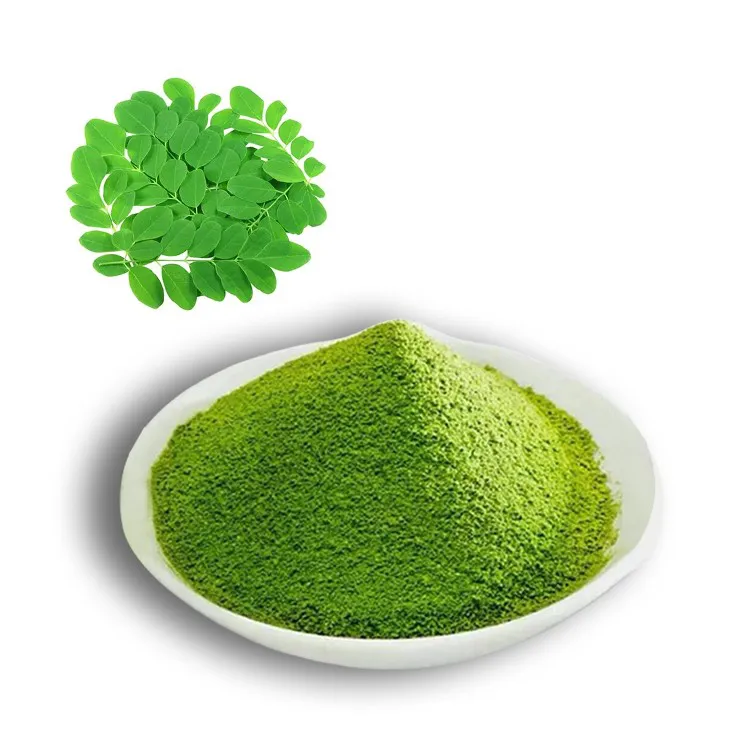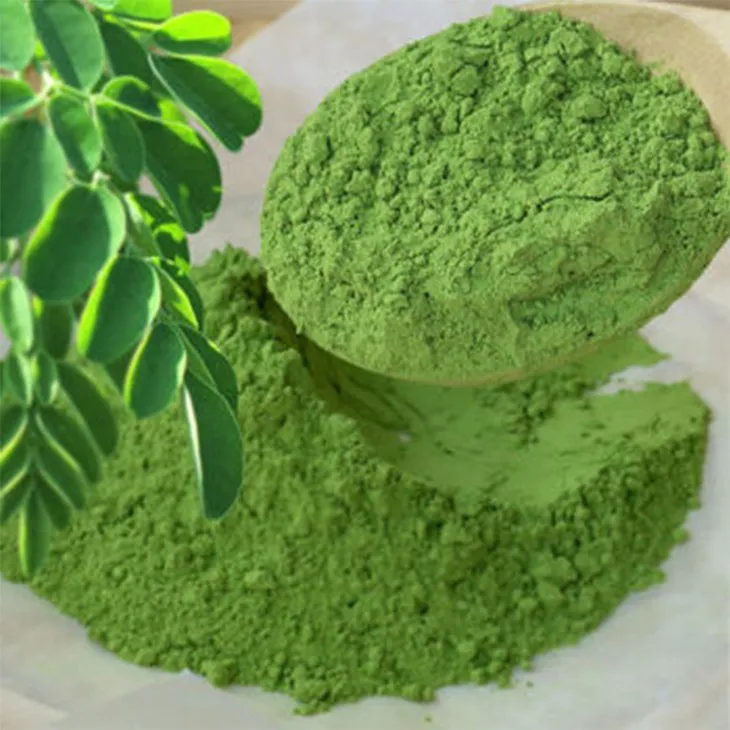- 0086-571-85302990
- sales@greenskybio.com
Use moringa powder? Make sure you source it from sustainable suppliers!
2024-12-14

Introduction
Moringa powder has emerged as a highly sought - after product in recent years. Its numerous health benefits, including high nutrient content, antioxidant properties, and potential to combat malnutrition, have made it a popular addition to smoothies, supplements, and various health - conscious recipes. However, as the demand for Moringa powder continues to rise, it is crucial to consider the source of this powder. Sourcing from sustainable suppliers is not only important for the environment and local communities but also for the consumers who are reaping the benefits of this "miracle" powder.

What is Moringa?
Moringa, also known as Moringa oleifera, is a fast - growing, drought - resistant tree native to parts of South Asia. It has been used for centuries in traditional medicine and as a food source in its native regions. The leaves of the moringa tree are rich in vitamins (such as vitamin A, C, and E), minerals (including calcium, potassium, and iron), and amino acids. These nutrients are what make Moringa powder so valuable in the modern health and wellness market.

The Importance of Sustainable Sourcing
Ethical Farming
1. Fair Labor Practices
- Sustainable suppliers of moringa powder are more likely to follow fair labor practices. This means that the farmers and workers involved in the cultivation and processing of moringa are paid a fair wage. In many developing regions where moringa is grown, fair wages can have a significant impact on the livelihoods of local communities. For example, in rural areas of India or Africa, where poverty is prevalent, fair pay for moringa - related work can provide families with the means to send their children to school, access healthcare, and improve their overall quality of life.
- These suppliers also ensure safe working conditions for their employees. Workers are not exposed to harmful chemicals without proper protection, and they are provided with the necessary training and equipment to carry out their tasks. This is in contrast to some non - sustainable farming operations where workers may be at risk of pesticide exposure or overexertion due to long working hours and lack of proper facilities.
- Sustainable moringa suppliers often invest in the local communities where they operate. They may support infrastructure development such as building schools, clinics, or improving access to clean water. By doing so, they are not only contributing to the well - being of the moringa - growing communities but also ensuring the long - term viability of their supply chain. For instance, a well - educated community is more likely to produce high - quality moringa products, and a healthy community can better support the labor - intensive process of moringa cultivation.
- These suppliers may also encourage local entrepreneurship. They can provide training and resources to local farmers and small - scale entrepreneurs, enabling them to add value to the moringa products they produce. This could involve teaching them about new processing techniques or helping them to market their products more effectively, which in turn can boost the local economy.
Ecological Benefits
1. Biodiversity Conservation
- When moringa is sourced from sustainable suppliers, it is often grown in a way that promotes biodiversity. Moringa trees can be part of agroforestry systems, where they are planted alongside other native plants and trees. This creates a more diverse ecosystem that can support a wide range of wildlife, from insects to birds and small mammals. For example, the flowers of the moringa tree can attract pollinators such as bees, which are essential for the reproduction of many plant species in the area.
- By contrast, non - sustainable farming practices may involve large - scale monoculture, which can have a negative impact on biodiversity. Monoculture plantations of moringa can lead to the displacement of native species, disrupt ecological balance, and make the area more vulnerable to pests and diseases.
- Moringa is a nitrogen - fixing tree, which means it has the ability to improve soil fertility. Sustainable suppliers are likely to manage their moringa plantations in a way that maximizes this benefit. For example, they may use proper crop rotation techniques, planting moringa in rotation with other crops to maintain soil health. The leaves of the moringa tree also fall and decompose, adding organic matter to the soil, which improves its structure, water - holding capacity, and nutrient content.
- On the other hand, unsustainable farming methods may deplete the soil of nutrients over time. Intensive use of chemical fertilizers without proper soil management can lead to soil degradation, making it less productive and more susceptible to erosion.
- Moringa's drought - resistant nature makes it an ideal crop for water - scarce regions. Sustainable suppliers understand the importance of water conservation and manage their moringa cultivation accordingly. They may use efficient irrigation methods such as drip irrigation, which delivers water directly to the roots of the plants, minimizing water wastage. Additionally, the presence of moringa trees can also help in water conservation at a landscape level. The deep roots of the moringa tree can help in groundwater recharge and prevent soil erosion, which in turn helps to maintain water quality.
- In contrast, some non - sustainable farming operations may over - irrigate, leading to water wastage and potential waterlogging of the soil, which can be harmful to the moringa plants and the surrounding ecosystem.
Consumer Health
1. Quality Assurance
- Sustainable suppliers are more likely to adhere to strict quality control standards. This includes proper harvesting, processing, and storage of moringa powder. For example, they will harvest the moringa leaves at the optimal time to ensure maximum nutrient content. They also use clean and hygienic processing facilities, which reduces the risk of contamination. This is crucial for consumers as it ensures that the moringa powder they consume is of high quality and free from harmful substances.
- Non - sustainable sources may cut corners in terms of quality control. For instance, they may use pesticides or fertilizers in excess, which can leave residues on the moringa leaves. These residues can then find their way into the moringa powder and pose a risk to consumer health.
- Many sustainable moringa suppliers are committed to organic farming practices. This means that they avoid the use of synthetic pesticides, fertilizers, and genetically modified organisms (GMOs). Organic moringa powder is not only better for the environment but also for consumers who prefer to avoid exposure to potentially harmful chemicals. Organic farming also promotes the natural growth and development of the moringa tree, which may result in a more nutrient - rich powder.
- In some cases, non - sustainable sources may be more likely to use GMOs or non - organic farming methods. This can be a concern for consumers who are conscious about the origin and purity of the products they consume.

How to Identify a Sustainable Supplier
1. Certification
- Look for suppliers who have relevant certifications. For example, organic certifications such as USDA Organic (in the United States) or EU Organic (in the European Union) are good indicators of sustainable farming practices. These certifications ensure that the moringa powder has been produced according to strict organic standards, including restrictions on pesticide use, GMOs, and proper soil and water management.
- Fairtrade certifications are also important. Fairtrade - certified suppliers are committed to fair labor practices and community development. They ensure that farmers receive a fair price for their moringa products and that the communities involved in the production process are supported.
- A sustainable supplier should be transparent about their sourcing and production processes. They should be able to provide information about where the moringa is grown, how it is cultivated, and what processing methods are used. This transparency allows consumers to make informed decisions about the products they are purchasing.
- If a supplier is reluctant to share this information, it may be a sign that they are not following sustainable practices. For example, they may be hiding information about the use of pesticides or unethical labor practices.
- Research the supplier's reputation in the market. Look for reviews from other customers, industry experts, or environmental and social organizations. A supplier with a good reputation is more likely to be sustainable. For example, if a moringa powder supplier has received positive reviews for their quality, ethical practices, and environmental stewardship, it is a strong indication that they are a reliable source.
- On the other hand, if a supplier has a history of complaints regarding product quality, labor issues, or environmental violations, it is best to avoid them.
Conclusion
As the popularity of moringa powder continues to grow, it is essential for consumers to be aware of the importance of sourcing it from sustainable suppliers. By choosing a sustainable supplier, consumers can support ethical farming practices, contribute to ecological conservation, and ensure their own health and well - being. Whether it's through looking for certifications, evaluating transparency, or researching reputation, there are several ways to identify a sustainable moringa powder supplier. By making this conscious choice, we can all play a part in promoting a more sustainable and healthy future for the moringa industry and the communities involved.
FAQ:
Q1: Why is it important to source moringa powder from sustainable suppliers?
It is crucial to source moringa powder from sustainable suppliers for several reasons. Firstly, sustainable suppliers are more likely to engage in ethical farming practices. This means they treat their workers fairly, providing proper wages and working conditions. Secondly, from an ecological perspective, sustainable sourcing ensures that the cultivation of moringa does not harm the environment. For example, it may involve proper land management to prevent soil erosion and water pollution. Finally, for consumer health, sustainable suppliers are more likely to follow strict quality control standards, ensuring that the moringa powder is pure and free from contaminants.
Q2: How can one identify a sustainable moringa powder supplier?
To identify a sustainable moringa powder supplier, you can look for certain indicators. Check if the supplier has certifications related to sustainable farming, such as organic certifications. Research their farming methods - sustainable suppliers often use natural fertilizers and pest control methods. Also, look into their supply chain transparency. A reliable sustainable supplier will be open about where their moringa is sourced from and how it is processed. Additionally, you can read customer reviews and testimonials to see if others have had positive experiences regarding the sustainability of the product.
Q3: What are the ethical farming practices associated with sustainable moringa powder production?
Ethical farming practices in sustainable moringa powder production include fair treatment of farmers and workers. This means paying them a living wage and providing safe working conditions. Sustainable producers also avoid the use of child labor. In terms of agricultural practices, they may practice crop rotation to maintain soil fertility. They use natural pest control methods like introducing beneficial insects rather than relying on harmful pesticides. Also, they ensure that the moringa trees are planted in a way that does not disrupt the local ecosystem and respects the rights of local communities, for example, by not encroaching on their land.
Q4: Are there any ecological benefits specific to sustainable moringa powder sourcing?
Yes, there are several ecological benefits. Sustainable sourcing of moringa powder often involves agro - forestry systems. Moringa trees can help prevent soil erosion as their roots hold the soil firmly. They also contribute to water conservation as they can reduce water runoff. In addition, sustainable farming of moringa may encourage biodiversity. The trees can provide a habitat for various insects, birds, and other small animals. Moreover, by using natural and sustainable farming methods, there is less risk of chemical pollution to the soil, water, and air.
Q5: How does sourcing from sustainable suppliers affect the quality of moringa powder?
Sourcing from sustainable suppliers can have a positive impact on the quality of moringa powder. Sustainable suppliers are more likely to follow strict quality control procedures. They may ensure that the moringa is harvested at the right time, which is crucial for maximizing its nutritional content. Also, they are less likely to use harmful chemicals during cultivation, which means the final product is less likely to be contaminated. Moreover, sustainable suppliers may invest in better processing and storage methods, which helps to preserve the freshness and potency of the moringa powder.
Related literature
- Sustainable Sourcing of Moringa: A Comprehensive Guide"
- "The Importance of Ethical Farming in Moringa Production"
- "Ecological Impact of Moringa Powder Sourcing"
- ▶ Hesperidin
- ▶ Citrus Bioflavonoids
- ▶ Plant Extract
- ▶ lycopene
- ▶ Diosmin
- ▶ Grape seed extract
- ▶ Sea buckthorn Juice Powder
- ▶ Fruit Juice Powder
- ▶ Hops Extract
- ▶ Artichoke Extract
- ▶ Mushroom extract
- ▶ Astaxanthin
- ▶ Green Tea Extract
- ▶ Curcumin
- ▶ Horse Chestnut Extract
- ▶ Other Product
- ▶ Boswellia Serrata Extract
- ▶ Resveratrol
- ▶ Marigold Extract
- ▶ Grape Leaf Extract
- ▶ New Product
- ▶ Aminolevulinic acid
- ▶ Cranberry Extract
- ▶ Red Yeast Rice
- ▶ Red Wine Extract
-
Tormentil Extract
2024-12-14
-
Fig Extract
2024-12-14
-
Konjac Powder
2024-12-14
-
Grapefruit Seed Extract Powder
2024-12-14
-
Hawthorn Extract
2024-12-14
-
Panax Ginseng Leaf Extract
2024-12-14
-
Yohimbine Bark Extract
2024-12-14
-
Sugarcane Extract
2024-12-14
-
melatonin extract
2024-12-14
-
Wheat Germ Extract
2024-12-14





















